الأسواق
عند تصميم تدخل إنساني وتحديد ما إذا كان سيتم استخدام المساعدات النقدية والقسائم، يجب أن يكون تحليل السوق جزءًا من تحليل الاستجابة الشامل. وثبت أن دعم الأسواق للعمل بشكل جيد يؤدي إلى تعافي أسرع وزيادة المرونة في المناطق المتضررة من الكوارث.
واستثمرت العديد من المنظمات في تطوير أدوات لدعم تحليل السوق وتفكر في البرمجة القائمة على السوق بشكل أكثر شمولية. يشمل ذلك التدخلات التي تستخدم السوق (مثل التحويلات النقدية إلى السكان المتضررين)، بالإضافة إلى التدخلات التي تدعم الأسواق بشكل مباشر (مثل المنح المشروطة للمتداولين لإعادة تشغيل أسواقهم).
Related initiatives
Featured content

Introduction to Market Analysis
دورة تدريبية
This 30 minute online course provides an introduction to the analysis of markets in emergency contexts, with input from some of the world’s leading thinkers on the topic.

A Practical Guide to Market Analysis in Humanitarian response
دورة تدريبية
A three to four hour online course designed to provide future humanitarian market assessment team members with a solid understanding of theory and steps of market assessments so that they can join assessment teams prepared with a basic understanding of what they will be doing and why.
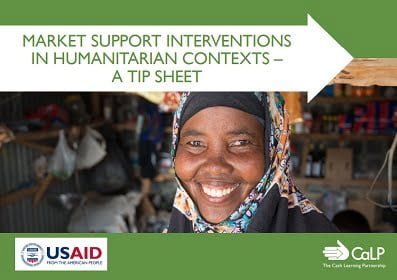
Market Support Interventions in Humanitarian Contexts – a Tip Sheet
Guidelines and Tools
This tip sheet defines what market support programming in humanitarian contexts is, and what it can look like in practice. It enables humanitarian practitioners to systematically consider market support interventions alongside other programme activities. The scope includes support interventions focusing on supply/availability and on demand/access. The tip sheet is based on secondary data...
Latest
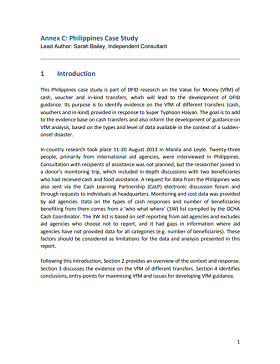
Annex C: Philippines Case Study
Report
This Philippines case study is part of DFID research on the Value for Money (VfM) of cash, voucher and in-kind transfers, which will lead to the development of DFID guidance. Its purpose is to identify evidence on the VfM of different transfers (cash, vouchers and in-kind) provided in response to Super...
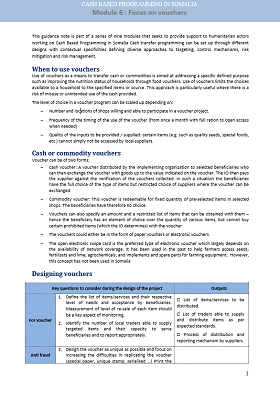
Cash Based Programming In Somalia – Module 6: Focus On Vouchers
Report
This guidance note is part of a series of nine modules that seeks to provide support to humanitarian actors working on Cash Based Programming in Somalia Cash transfer programming can be set up through different designs with contextual specificities defining diverse approaches to targeting, control...

A Review of Evidence of Humanitarian Cash Transfer Programming in Urban Areas: Annexes
Report
Annexes to accompany the working paper ‘A review of evidence
of humanitarian cash transfer programming in urban areas”
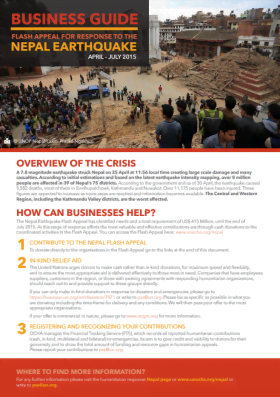
Business Guide – Flash appeal for response to the Nepal earthquake
Policy paper
An overview of the main humanitarian issues facing Nepal following the 2015 Earthquake, as well as indicators as to how businesses can assist with disaster response.

Guidance Notes: Cash Transfers in Livelihoods Programming- West Africa
Guidelines and Tools
A growing acceptance of cash transfers as an inter-sectorial tool is accompanied by a better understanding of this approach and its potential to break the cycle of poverty, after much discussion on the role cash transfers have to play in building resilience. In the Sahel, food security experts have...

Philippines Haiyan Response – A multi-sectoral review of the use of market analysis and the design and implementation of CTPs
Report
Following Typhoon Haiyan, which hit the Philippines on November 8 2014, at least 45 aid agencies chose to implement Cash Transfer Programming (CTP) to assist the more than 16 million people affected. Cash transfers were a logical approach in a country with developed market systems, strong financial...
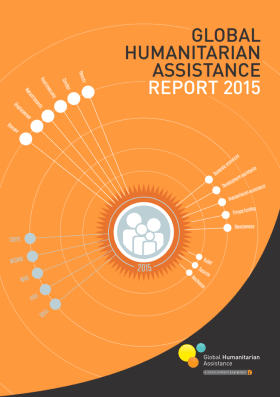
Global Humanitarian Assistance Report 2015
Report
Humanitarian financing is in the spotlight like never before. An extraordinary combination of crises continues to test international, national and local capacity to prevent, prepare and respond as needs continue to outstrip available resources. Global processes taking place during 2015 and 2016 –...

Financial Services Primer for Humanitarians
Guidelines and Tools
Financial services facilitate a wide range of economic and households activities in any society. They enable trade and business expansion and allow individuals to save, send and borrow money. Humanitarian cash transfers, particularly when delivered electronically,can expand access to financial services...

Cost-Effectiveness Analysis of Cash-Based Food Assistance Projects: A case study and discussion paper of findings in Niger
Report
Despite recent and expanding literature on cost effectiveness and value for money, there is little by way of guidance for the implementation of cost-effectiveness analysis in humanitarian and development programming. This report distills findings from the literature on ex post cost-effectiveness analysis,...

Protection Risks and Benefits Analysis Tool
Report
This tool provides global evidence on the protection risks and benefits of cash-based interventions, divided into key protection areas. It outlines the key questions that practitioners should explore to reach a context-specific, participatory identification of protection risks and benefits of a given...
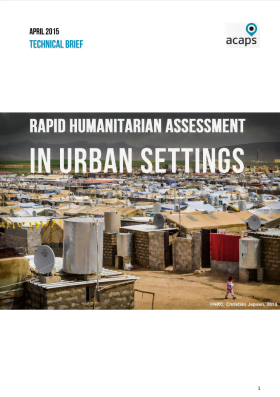
Rapid Humanitarian Assessment in Urban Settings
Guidelines and Tools
This Technical Brief is intended to be a starting point for improving coordinated needs assessments in urban areas, without which the humanitarian community will not be able to ensure the quality and accountability of urban response itself. It provides guidance on carrying out joint rapid assessments of...

Impact of Multipurpose Cash Assistance on Outcomes for Children in Lebanon
Report
This report examines the impact of multipurpose cash assistance (MCA) on children, specifically looking at child outcomes and child protection outcomes, in Lebanon. The impact of the Lebanon Cash Consortium MCA program was measured using a variety of indicators for shelter quality and consistency, child...

Exploring Food Assistance Programmes: Evidence for Lebanon
Report
The purpose of this study is to analyse how markets in Lebanon have responded to the increased demand from the Syrian refugees. More specifically, the study focuses on the micro-level impacts of market-based food assistance on the market supply chains and market performance. It explores the pros and cons...
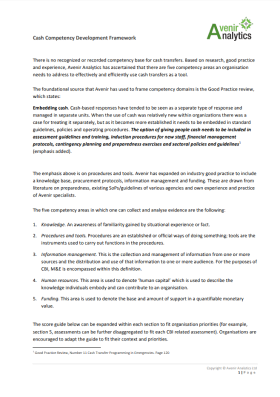
Cash Competency Development Framework
Guidelines and Tools
There is no recognized or recorded competency base for cash transfers. Based on research, good practice and experience, Avenir Analytics has ascertained that there are five competency areas as an organisation needs to address to effectively and efficiently use cash transfers as a tool.
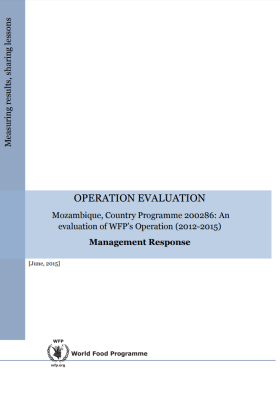
Mozambique, Country Programme 200286: An evaluation of WFP’s operation (2012-2015) – Management Response
Report
The final evaluation covers WFP’s country programme (CP) 200286 (2012-2015). It was intended for both accountability and learning purposes and focuses on assessing: the appropriateness and coherence of the operation its results the factors explaining the results. The evaluation assessed the...

Cash in Emergencies Toolkit
Guidelines and Tools
Access Toolkit Here Cash transfer based programming (CTP) is an effective and flexible way to support people affected by emergencies, maintaining their dignity and choice, while fostering local economies. CTP includes all forms of cash and voucher-based assistance. The Cash in Emergencies Toolkit has been...

Tips for Protection in Cash based interventions
Guidelines and Tools
This document presents a set of general tips to identify, monitor and mitigate protection risks and maximize protection benefits of cash-based interventions.
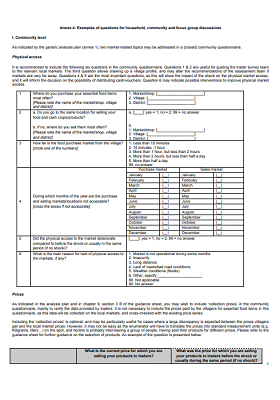
Annex 4: Examples of questions for household, community and focus group discussions
Report
It is recommended to include the following six questions in the community questionnaire. Questions 1 & 2 are useful for guiding the trader survey team to the relevant local markets. The third question allows drawing up a village profile, and may alter the recommendations of the assessment team if markets...
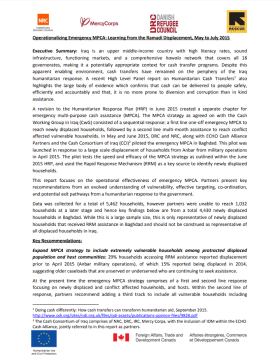
Operationalizing Emergency MPCA: Learning from the Ramadi displacement, May to July 2015
Report
Iraq is an upper middle-income country with high literacy rates, sound infrastructure, functioning markets, and a comprehensive hawala network that covers all 18 governorates, making it a potentially appropriate context for cash transfer programs. Despite this apparent enabling environment, cash transfers...

Can Emergency Cash Transfers ‘Piggyback’ on Existing Social Protection Programmes?
Policy paper
This background note focuses on the current discussion among actors in the humanitarian and social protection sectors regarding the use of existing social protection programmes to provide an emergency response. It outlines the overlaps between social protection and humanitarian responses, considers a...